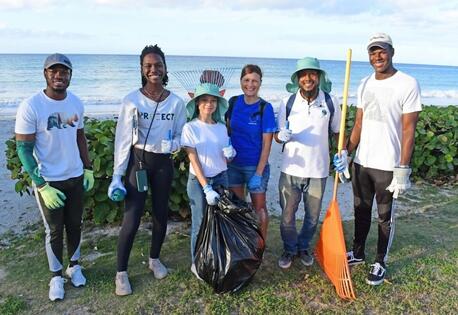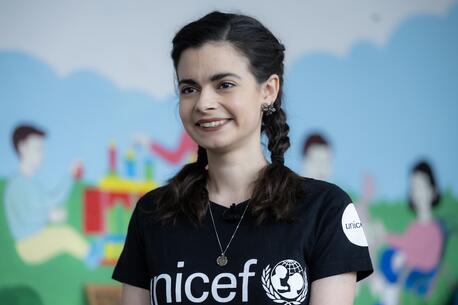Madagascar: Making Education a Priority
The fourth largest island in the world, Madagascar is a popular tourist destination, known for its beauty and exotic flora and fauna. The country is also one of the poorest in the world, ranking 151 of 187 on the UNDP’s Human Development Index. Among the many factors contributing to Madagascar’s deep poverty is its chronically underfunded education system.
Last month, UNICEF Education Specialist Sonia Sukdeo enlightened U.S. Fund for UNICEF staff about UNICEF’s strategies to maintain and strengthen the Malagasy education system. We learned that the challenges are stark: Less than 10% of the country’s 2 million children have access to preschool, and only 3 out of 10 girls graduate junior secondary school. Sukdeo described how investing in young children means investing in the economic future of Madagascar.
 UNICEF tackles the issue in many ways. UNICEF trains teachers, some of whom are under-qualified. It provides school supplies. And in an attempt to keep younger children in school longer, it constructs new preschools that are attached to existing primary schools. Sukdeo explained that this strategy is used to help integrate young children into the school system and ensure a smooth transition from preschool to primary. There are a number of obstacles that prevent children from advancing through secondary school, especially for girls. Early pregnancy and child marriage end many girls’ school careers; almost 34% of girls in Madagascar are married before turning 18. Sexual exploitation and the appalling practice of human trafficking keep girls out of the classroom as well. And for some, their parents simply do not see the long-term benefits of education for their daughters.
Sukdeo explained that a UNICEF advocacy campaign emphasizes the benefits of longer-term education and the negative impact of early pregnancy on young and uneducated mothers. UNICEF sponsors three different types of scholarships that cover all school expenses for eligible candidates. Plus, UNICEF provides transportation for students and constructs dormitories for girls that are in close proximity to the school.
Step by step, UNICEF is building more and more classrooms and is progressively engaging the government in order to secure sufficient budgetary support for teacher training and the retention of girls in the education system. The most important step, however, is the cultivation of awareness among the Malagasy people about the importance of education and its greater significance for the future of their country.
UNICEF tackles the issue in many ways. UNICEF trains teachers, some of whom are under-qualified. It provides school supplies. And in an attempt to keep younger children in school longer, it constructs new preschools that are attached to existing primary schools. Sukdeo explained that this strategy is used to help integrate young children into the school system and ensure a smooth transition from preschool to primary. There are a number of obstacles that prevent children from advancing through secondary school, especially for girls. Early pregnancy and child marriage end many girls’ school careers; almost 34% of girls in Madagascar are married before turning 18. Sexual exploitation and the appalling practice of human trafficking keep girls out of the classroom as well. And for some, their parents simply do not see the long-term benefits of education for their daughters.
Sukdeo explained that a UNICEF advocacy campaign emphasizes the benefits of longer-term education and the negative impact of early pregnancy on young and uneducated mothers. UNICEF sponsors three different types of scholarships that cover all school expenses for eligible candidates. Plus, UNICEF provides transportation for students and constructs dormitories for girls that are in close proximity to the school.
Step by step, UNICEF is building more and more classrooms and is progressively engaging the government in order to secure sufficient budgetary support for teacher training and the retention of girls in the education system. The most important step, however, is the cultivation of awareness among the Malagasy people about the importance of education and its greater significance for the future of their country.
 UNICEF tackles the issue in many ways. UNICEF trains teachers, some of whom are under-qualified. It provides school supplies. And in an attempt to keep younger children in school longer, it constructs new preschools that are attached to existing primary schools. Sukdeo explained that this strategy is used to help integrate young children into the school system and ensure a smooth transition from preschool to primary. There are a number of obstacles that prevent children from advancing through secondary school, especially for girls. Early pregnancy and child marriage end many girls’ school careers; almost 34% of girls in Madagascar are married before turning 18. Sexual exploitation and the appalling practice of human trafficking keep girls out of the classroom as well. And for some, their parents simply do not see the long-term benefits of education for their daughters.
Sukdeo explained that a UNICEF advocacy campaign emphasizes the benefits of longer-term education and the negative impact of early pregnancy on young and uneducated mothers. UNICEF sponsors three different types of scholarships that cover all school expenses for eligible candidates. Plus, UNICEF provides transportation for students and constructs dormitories for girls that are in close proximity to the school.
Step by step, UNICEF is building more and more classrooms and is progressively engaging the government in order to secure sufficient budgetary support for teacher training and the retention of girls in the education system. The most important step, however, is the cultivation of awareness among the Malagasy people about the importance of education and its greater significance for the future of their country.
UNICEF tackles the issue in many ways. UNICEF trains teachers, some of whom are under-qualified. It provides school supplies. And in an attempt to keep younger children in school longer, it constructs new preschools that are attached to existing primary schools. Sukdeo explained that this strategy is used to help integrate young children into the school system and ensure a smooth transition from preschool to primary. There are a number of obstacles that prevent children from advancing through secondary school, especially for girls. Early pregnancy and child marriage end many girls’ school careers; almost 34% of girls in Madagascar are married before turning 18. Sexual exploitation and the appalling practice of human trafficking keep girls out of the classroom as well. And for some, their parents simply do not see the long-term benefits of education for their daughters.
Sukdeo explained that a UNICEF advocacy campaign emphasizes the benefits of longer-term education and the negative impact of early pregnancy on young and uneducated mothers. UNICEF sponsors three different types of scholarships that cover all school expenses for eligible candidates. Plus, UNICEF provides transportation for students and constructs dormitories for girls that are in close proximity to the school.
Step by step, UNICEF is building more and more classrooms and is progressively engaging the government in order to secure sufficient budgetary support for teacher training and the retention of girls in the education system. The most important step, however, is the cultivation of awareness among the Malagasy people about the importance of education and its greater significance for the future of their country.

